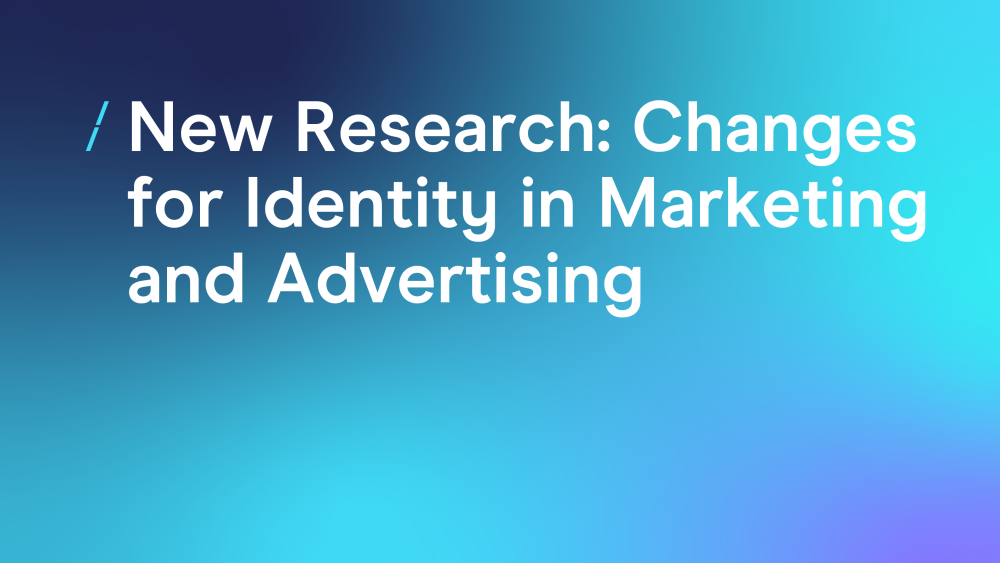New Research: Changes for Identity in Marketing and Advertising
27 Jul 2020

New research provides a comprehensive look at identity in a privacy-first, post-cookie world.
New York, 24 June, 2020 (GlobeNewswire) -- Today, Winterberry Group – a specialised management consultancy with extensive experience in advertising, marketing, data, technology, and commerce – released new research: “Identity Outlook 2020: The Evolution of Identity in a Privacy-First, Post-Cookie World.” The paper explores the current state and future outlook for identity in marketing and advertising.
“This research facilitates understanding of the complexities throughout the rapidly evolving market segment of identity and the significant challenges ahead due to regulatory interventions and evolving browser policies,” said Winterberry Group’s Senior Managing Partner, Bruce Biegel. “We see those challenges as positive catalysts for innovation and believe identity solutions can and will continue to be critical to marketers’ efforts to understand and engage with consumers.”
Winterberry Group found that by the end of 2021, the identity landscape is likely to see significant healthy changes, which will fuel the next stage of growth for the marketing and advertising industry. The findings are based on more than 80 hours of interviews conducted with more than 100 senior industry experts in the U.S. and European identity ecosystem, including solution providers, technology companies, publishers, data companies, and legal experts focused on privacy considerations.
The research finds a number of critical ways identity solutions are evolving and being applied:
Overlapping Ecosystems: the personalisation on (first-party) owned properties, programmatic and advanced TV media ecosystems will leverage a blend of identity approaches, based on the unique use cases in each sector.
Five Identity Approaches: in response to a more restricted and technologically complex landscape, five unique non-cookie-based identity solutions have emerged. Industry consensus is that there is no desire for one single solution and multiple solutions will be leveraged based on use case, ecosystem, identifiers, and geographies.
Publisher Prowess: publishers will have the opportunity to regain control in the programmatic landscape through their first-party data.
Co-Operation: in the evolving landscape it will be key for publishers and brands to work together to compete with the walled gardens and provide scale to smaller players.
Back to the Future: measurement and attribution will become more challenging due to industry fragmentation.
“Brands want to build real relationships with customers,” said Kyle Hollaway, Head of Acxiom’s Global Identity Practice. “Solving for identity is foundational, and brands are looking for a scalable, flexible way to build private first-party identity graphs to unify their adtech and martech stacks and enable seamless experiences across all channels. When brands get identity right, everyone wins.”
“The future-state of our industry hinges on two things: neutrality and interoperability. Both are non-negotiable in order for any identity solution to achieve widespread adoption and scale,” said Travis Clinger, Senior Vice President, Head of Addressability and Ecosystem at LiveRamp. “In addition, we must prioritise advertising technologies that are publisher-supported. If publishers become disintermediated from their end user, the open internet as we know it breaks down. We have to proactively and collectively seek out solutions that fortify the position of publishers, while enhancing the consumer experience, and putting consumer privacy first.”
“We believe it’s imperative for organisations to build and grow their own enterprise, private identity graphs based on first-party data and with maximum transparency and control in the next few years. Those who do will achieve significant competitive advantages,” said Gerry Bavaro, Chief Strategy Officer of Merkury, Merkle’s identity and data platform business.
“The demise of the third-party cookie coupled with the impacts of a global pandemic has accelerated many changes within the advertising ecosystem and put a renewed focused on the importance of identity,” said Matt Spiegel, Executive Vice President and Head of Media Vertical at TransUnion. “Alternative identifiers and a comprehensive understanding of the new consumer data identity offer a path forward to building that singular, persistent view. The pace and complexity of change are not likely to let up, especially as consumers move across devices and consume content in new ways, so the need for the industry to offer better ways to connect and communicate with consumers becomes even more critical.”
Premier sponsors: Acxiom, LiveRamp, Merkury powered by Merkle, and TransUnion.
Supporting sponsors: Lotame, Neustar, Tapad, and Zeotap.
Winterberry Group is a specialised management consultancy with extensive experience in advertising, marketing, data, technology, and commerce. Winterberry Group’s proven methodologies address the needs of firms in its core industries, enabling brands, publishers, marketing service providers, and technology developers to understand emerging opportunities, create actionable strategies, and grow their value and global impact.
Contact:
Steve Stratz
206.300.9134
steve@relevanzpr.com
Read the original press release, here.
The DMA’s Responsible Marketing campaign aims to create a sustainable future for the industry by promoting responsible marketing as a driver for business growth. Discover more about the committee.
Please login to comment.
Comments